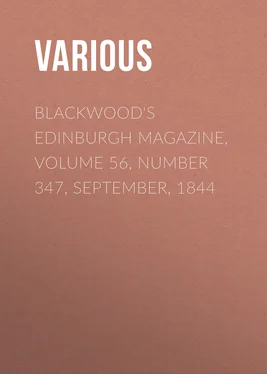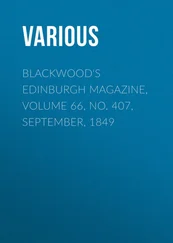Various - Blackwood's Edinburgh Magazine, Volume 56, Number 347, September, 1844
Здесь есть возможность читать онлайн «Various - Blackwood's Edinburgh Magazine, Volume 56, Number 347, September, 1844» — ознакомительный отрывок электронной книги совершенно бесплатно, а после прочтения отрывка купить полную версию. В некоторых случаях можно слушать аудио, скачать через торрент в формате fb2 и присутствует краткое содержание. Издательство: Иностранный паблик, Жанр: foreign_antique, periodic, foreign_edu, на английском языке. Описание произведения, (предисловие) а так же отзывы посетителей доступны на портале библиотеки ЛибКат.
- Название:Blackwood's Edinburgh Magazine, Volume 56, Number 347, September, 1844
- Автор:
- Издательство:Иностранный паблик
- Жанр:
- Год:неизвестен
- ISBN:нет данных
- Рейтинг книги:3 / 5. Голосов: 1
-
Избранное:Добавить в избранное
- Отзывы:
-
Ваша оценка:
- 60
- 1
- 2
- 3
- 4
- 5
Blackwood's Edinburgh Magazine, Volume 56, Number 347, September, 1844: краткое содержание, описание и аннотация
Предлагаем к чтению аннотацию, описание, краткое содержание или предисловие (зависит от того, что написал сам автор книги «Blackwood's Edinburgh Magazine, Volume 56, Number 347, September, 1844»). Если вы не нашли необходимую информацию о книге — напишите в комментариях, мы постараемся отыскать её.
Blackwood's Edinburgh Magazine, Volume 56, Number 347, September, 1844 — читать онлайн ознакомительный отрывок
Ниже представлен текст книги, разбитый по страницам. Система сохранения места последней прочитанной страницы, позволяет с удобством читать онлайн бесплатно книгу «Blackwood's Edinburgh Magazine, Volume 56, Number 347, September, 1844», без необходимости каждый раз заново искать на чём Вы остановились. Поставьте закладку, и сможете в любой момент перейти на страницу, на которой закончили чтение.
Интервал:
Закладка:
But onwards—always onwards,
In silence and in gloom,
The dreary pageant labour’d,
Till it reach’d the house of doom:
But first a woman’s voice was heard
In jeer and laughter loud, 12 12 “It is remarkable, that of the many thousand beholders, the Lady Jean Gordon, Countess of Haddington, did (alone) publicly insult and laugh at him; which being perceived by a gentleman in the street, he cried up to her, that it became her better to sit upon the cart for her adulteries.”— Wigton Papers. This infamous woman was the third daughter of Huntly, and the niece of Argyle. It will hardly be credited that she was the sister of that gallant Lord Gordon, who fell fighting by the side of Montrose, only five years before, at the battle of Aldford!
And an angry cry and a hiss arose
From the heart of the tossing crowd:
Then, as the Græme look’d upwards,
He caught the ugly smile
Of him who sold his King for gold—
The master-fiend Argyle!
The Marquis gazed a moment,
And nothing did he say,
But the cheek of Argyle grew ghastly pale,
And he turn’d his eyes away.
The painted harlot at his side,
She shook through every limb,
For a roar like thunder swept the street,
And hands were clench’d at him,
And a Saxon soldier cried aloud,
“Back, coward, from thy place!
For seven long years thou hast not dared
To look him in the face.” 13 13 “The Lord Lorn and his new lady were also sitting on a balcony, joyful spectators; and the cart being stopt when it came before the lodging where the Chancellor, Argyle, and Warristoun sat—that they might have time to insult—he, suspecting the business, turned his face towards them, whereupon they presently crept in at the windows: which being perceived by an Englishman, he cried up, it was no wonder they started aside at his look, for they durst not look him in the face these seven years bygone.”— Wigton Papers.
Had I been there with sword in hand
And fifty Camerons by,
That day through high Dunedin’s streets
Had peal’d the slogan cry.
Not all their troops of trampling horse,
Nor might of mailéd men—
Not all the rebels in the south
Had borne us backwards then!
Once more his foot on Highland heath
Had stepp’d as free as air,
Or I, and all who bore my name,
Been laid around him there!
It might not be. They placed him next
Within the solemn hall,
Where once the Scottish Kings were throned
Amidst their nobles all.
But there was dust of vulgar feet
On that polluted floor,
And perjured traitors fill’d the place
Where good men sate before.
With savage glee came Warristoun 14 14 Archibald Johnston of Warristoun. This man, who was the inveterate enemy of Montrose, and who carried the most selfish spirit into every intrigue of his party, received the punishment of his treasons about eleven years afterwards. It may be instructive to learn how he met his doom. The following extract is from the MSS. of Sir George Mackenzie:—“The Chancellor and others waited to examine him; he fell upon his face, roaring, and with tears entreated they would pity a poor creature who had forgot all that was in the Bible. This moved all the spectators with a deep melancholy; and the Chancellor, reflecting upon the man’s great parts, former esteem, and the great share he had in all the late revolutions, could not deny some tears to the frailty of silly mankind. At his examination, he pretended he had lost so much blood by the unskilfulness of his chirurgeons, that he lost his memory with his blood; and I really believe that his courage had been drawn out with it. Within a few days he was brought before the parliament, where he discovered nothing but much weakness, running up and down upon his knees, begging mercy; but the parliament ordained his former sentence to be put to execution, and accordingly he was executed at the cross of Edinburgh.”
To read the murderous doom,
And then uprose the great Montrose
In the middle of the room.
“Now by my faith as belted knight,
And by the name I bear,
And by the red Saint Andrew’s cross
That waves above us there—
Ay, by a greater, mightier oath—
And oh, that such should be!—
By that dark stream of royal blood
That lies ’twixt you and me—
I have not sought in battle field
A wreath of such renown,
Nor dared I hope, on my dying day,
To win the martyr’s crown!
“There is a chamber far away
Where sleep the good and brave,
But a better place ye have named for me
Than by my father’s grave.
For truth and right, ’gainst treason’s might,
This hand has always striven,
And ye raise it up for a witness still
In the eye of earth and heaven.
Then nail my head on yonder tower—
Give every town a limb—
And God who made shall gather them.—
I go from you to Him!” 15 15 “He said he was much beholden to the parliament for the honour they put on him; ‘for,’ says he, ‘I think it a greater honour to have my head standing on the port of this town, for this quarrel, than to have my picture in the king’s bedchamber. I am beholden to you, that, lest my loyalty should be forgotten, ye have appointed five of your most eminent towns to bear witness of it to posterity.’”— Wigton Papers.
The morning dawn’d full darkly,
The rain came flashing down,
And the jagged streak of the levin-bolt
Lit up the gloomy town:
The heavens were speaking out their wrath,
The fatal hour was come,
Yet ever sounded sullenly
The trumpet and the drum.
There was madness on the earth below,
And anger in the sky,
And young and old, and rich and poor,
Came forth to see him die.
Ah, God! That ghastly gibbet!
How dismal ’tis to see
The great tall spectral skeleton,
The ladder, and the tree!
Hark! hark! It is the clash of arms—
The bells begin to toll—
He is coming! he is coming!
God’s mercy on his soul!
One last long peal of thunder—
The clouds are clear’d away,
And the glorious sun once more looks down
Amidst the dazzling day.
He is coming! he is coming!
Like a bridegroom from his room, 16 16 “In his downgoing from the Tolbooth to the place of execution, he was very richly clad in fine scarlet, laid over with rich silver lace, his hat in his hand, his bands and cuffs exceeding rich, his delicate white gloves on his hands, his stockings of incarnate silk, and his shoes with their ribands on his feet; and sarks provided for him with pearling about, above ten pund the elne. All these were provided for him by his friends, and a pretty cassock put on upon him, upon the scaffold, wherein he was hanged. To be short, nothing was here deficient to honour his poor carcase, more beseeming a bridegroom than a criminal going to the gallows.”—Nicholl’s Diary .
Came the hero from his prison
To the scaffold and the doom.
There was glory on his forehead,
There was lustre in his eye,
And he never walk’d to battle
More proudly than to die:
There was colour in his visage,
Though the cheeks of all were wan,
And they marvell’d as they saw him pass,
That great and goodly man!
He mounted up the scaffold,
And he turn’d him to the crowd;
But they dared not trust the people,
So he might not speak aloud.
But he look’d upon the heavens,
And they were clear and blue,
And in the liquid ether
The eye of God shone through:
Yet a black and murky battlement
Lay resting on the hill,
As though the thunder slept within—
All else was calm and still.
Интервал:
Закладка:
Похожие книги на «Blackwood's Edinburgh Magazine, Volume 56, Number 347, September, 1844»
Представляем Вашему вниманию похожие книги на «Blackwood's Edinburgh Magazine, Volume 56, Number 347, September, 1844» списком для выбора. Мы отобрали схожую по названию и смыслу литературу в надежде предоставить читателям больше вариантов отыскать новые, интересные, ещё непрочитанные произведения.
Обсуждение, отзывы о книге «Blackwood's Edinburgh Magazine, Volume 56, Number 347, September, 1844» и просто собственные мнения читателей. Оставьте ваши комментарии, напишите, что Вы думаете о произведении, его смысле или главных героях. Укажите что конкретно понравилось, а что нет, и почему Вы так считаете.












